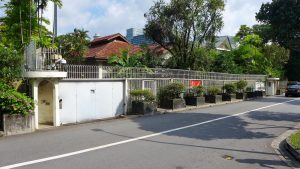The youngest son of Singapore’s late former Prime Minister Lee Kuan Yew is seeking permission to demolish the family’s home in central Singapore, threatening to inflame a dispute that has divided the Lee siblings since their father’s death.
In a Facebook post today, Lee Hsien Yang, 67, announced that in order “to honor my parents’ last wishes, I am applying to demolish the house at 38 Oxley Road and thereafter to build a small private dwelling, to be held within the family in perpetuity.”
Hsien Yang, who lives overseas, said in the past that he is “the sole legal owner” of the property and, following his sister’s death, “the only living executor” of Lee Kuan Yew’s estate.
“In his will, he wished for the house to be demolished ‘immediately after’ Wei Ling moved out of the house. It is my duty to carry out his wishes to the fullest extent of the law,” he said.
The eight-bedroom bungalow at 38 Oxley Road, which was built by a Dutch merchant in 1898, was the elder Lee’s home from the end of World War II until his death in 2015. It was also the home of his daughter, Lee Wei Ling, a neurologist who died last week at the age of 69. Prior to her death, she and Lee Hsien Yang had been locked in a complicated dispute with their elder brother, Lee Hsien Loong, who led Singapore for nearly two decades before stepping down in May.
The dispute centers on the question of whether or not to demolish the house. In his final will, Lee Kuan Yew left 38 Oxley Road house to Lee Hsien Loong, with a clause that allowed Lee Wei Ling to stay in it for as long as she desired. Once she left, he expressed a desire that the home be demolished and if that were not possible, that it should be closed to everyone except family members and descendants. Lee seemingly feared the family’s private quarters being turned into political kitsch and laid open to public display.
The dispute broke into public view in June 2017, when Hsien Yang and Wei Ling posted messages on social media accusing their brother of misrepresenting their father’s wishes and of using the power of the state to prevent the demolition of the property. The pair claimed that he did so in part through the creation of a Ministerial Committee on 38 Oxley Road to consider the property’s future, even though Lee Sr.’s wishes were seemingly clear.
The feud, which was covered in exhaustive detail in the Singaporean press as well as making headlines internationally, was politically embarrassing for Prime Minister Lee and the ruling People’s Action Party (PAP). Eventually, Lee Hsien Loong agreed to submit himself to a grilling in Parliament in July 2017. During the two-day session, the Singaporean leader described his siblings’ allegations as “entirely baseless” and said that the public airing of their grievances had “damaged Singapore’s reputation.”
Lee Hsien Loong later raised questions about the legitimacy of his father’s will, claiming in 2017 that a clause about the demolition was removed in the fifth and sixth versions of the will, and was only reinserted in the seventh and final version, although he did not challenge it legally. He also promised to recuse himself from any future decision regarding the property.
The question of what to do with the property was complicated by Lee Kuan Yew’s hallowed political reputation in Singapore, and his status as the man who laid the foundation of the nation’s astonishing economic success. In 2011, Singapore’s then Cabinet expressed its opposition to demolishing the home, on the grounds that it was historically significant and should be preserved for posterity.
In 2018, the Ministerial Committee laid out three options for how the property could be handled after Wei Ling moved out. The first option was to preserve the property by designating it a National Monument. The second was to retain the dining room, which played an important role in the early history of the PAP, while demolishing the remainder of the house. The third option was to allow the residence to be demolished and the site redeveloped. In reaching these options, the Committee expressed its view that Lee Sr. “was prepared to accept options other than demolition, provided that suitable arrangements were made to ensure that: (i) the Property was refurbished, and kept in a habitable state; and (ii) the family’s privacy was protected.”
The ministerial committee did not make a final decision at the time, given that Wei Ling was still living at 38 Oxley Road. But it said the options were “meant to help a future government make an informed and considered decision when the need arises.”
Wei Ling’s death now threatens to reignite the dispute. The bungalow is currently owned by Hsien Yang, who purchased it from his brother in 2015. But as Bloomberg explains, Singapore’s laws “empower a minister to make a preservation order for a property designated as a monument, subject to a government board that can consider objections from the property’s owners and occupiers.”
Hsien Yang’s request for permission to demolish the property is therefore unlikely to be granted, at least without challenge. This could create a thorny political challenge for Prime Minister Lawrence Wong, who, as in his previous guise as minister of national development, sat on the Ministerial Committee on 38 Oxley Road.
The Lee family feud – in particular, the allegation that Lee Hsien Loong had attempted to exploit his father’s political legacy for personal gain – has already been embarrassing for the PAP, which prides itself on frictionless competence and an ability to settle its internal disputes away from the public eye. With an election due to be called by November 2025, Wong will be hoping for, if not seeking to engineer, a quiet resolution to the dispute – whether or not the home at 38 Oxley Road remains standing.

































